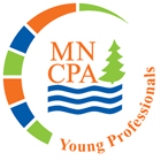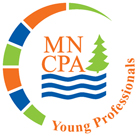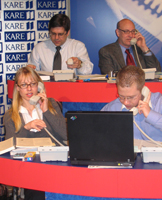
Minnesota Society of Certified Public Accountants
Encyclopedia
The Minnesota Society of Certified Public Accountants (MNCPA) is a professional association for certified public accountants (CPAs) in Minnesota
.
The MNCPA was founded in 1904 by a group of accountants with the purpose of elevating the profession and supporting passage of a Certified Public Accountant Law in Minnesota which was successful in 1909.
Today more than 9,400 members comprise the MNCPA, which remains focused on a similar goal: to help members succeed professionally while being mindful of serving the public interest.
Minnesota was the 19th state to organize a CPA society, nine years after the state of California
created the first CPA society in 1895.
Daily operation of the organization is overseen by a staff of 30 at the MNCPA office in Bloomington, Minnesota.
Members may volunteer to join MNCPA committees or task forces, which are designed to provide member input on programs, events or services. Such committees include conference task forces, legislative groups and ethics committees.
All MNCPA members fall into these categories:
More than 2,000 members are additionally categorized by chapter. The five chapters of the MNCPA include members living and working in communities across the state of Minnesota who benefit from additional programs and services.
MNCPA members renew their membership annually on the first of April.

issues through the MNCPA Government Relations program.
Individual CPAs holding an active certificate in Minnesota are required to earn eight hours of continuing professional education in the area of ethics every three years.
The MNCPA Professional Ethics Committee reviews complaints against MNCPA members and suggests disciplinary action based on the AICPA's Code of Professional Conduct. This is separate from any action by the Minnesota Board of Accountancy, the AICPA Ethics Division or other professional organizations.
Peer Review
should be an important factor for the public when selecting a CPA firm. Firms that undergo peer review on a regular basis show dedication to maintaining quality in the services provided by the firm.
consists of four parts (taken in any order):
To begin the exam process in Minnesota, a student with a completed bachelor's degree in accounting must submit the exam application on NASBA's website (National Association of State Boards of Accountancy). Once approved, the exam candidate will receive a Notice to Schedule allowing them to set their exam dates at a testing center.
Exam candidates must pass all four exam sections within 18 months to consider the exam completed.
Exam eligibility rules in Minnesota are set forth by the Minnesota Board of Accountancy.
In Minnesota, those who have completed the exam are referred to as "exam passers" while completing the remaining requirements for CPA certification.
Minnesota CPAs initially earn an active CPA certificate. Minnesota offers two certificate options:
Continuing professional education requirements are set and enforced by the Minnesota Board of Accountancy, outlined in Chapter 1105 of Minnesota Administrative Rules. CPAs must earn 120 hours of CPE every three years, including eight hours of ethics, with a minimum of 20 CPE hours annually.
A CPE year runs from July 1 to June 30 in Minnesota.
CPAs must be aware of the types of CPE accepted by the Minnesota Board of Accountancy. CPE limitations, including caps on self-study or courses offered by non-registered providers, exist to protect the credibility of the education required for the credential.

Minnesota
Minnesota is a U.S. state located in the Midwestern United States. The twelfth largest state of the U.S., it is the twenty-first most populous, with 5.3 million residents. Minnesota was carved out of the eastern half of the Minnesota Territory and admitted to the Union as the thirty-second state...
.
The MNCPA was founded in 1904 by a group of accountants with the purpose of elevating the profession and supporting passage of a Certified Public Accountant Law in Minnesota which was successful in 1909.
Today more than 9,400 members comprise the MNCPA, which remains focused on a similar goal: to help members succeed professionally while being mindful of serving the public interest.
History
The Minnesota Society of CPAs incorporated on July 14, 1904, with seven charter members. The organization originally incorporated under the title "Minnesota Society of Public Accountants." The Society adopted the current name in 1928 after merging with another organization for CPAs in Minnesota, the "Minnesota State Society of Certified Public Accountants."Minnesota was the 19th state to organize a CPA society, nine years after the state of California
California
California is a state located on the West Coast of the United States. It is by far the most populous U.S. state, and the third-largest by land area...
created the first CPA society in 1895.
Governance
The Minnesota Society of CPAs is governed by a 16-person, annually elected by the membership.Daily operation of the organization is overseen by a staff of 30 at the MNCPA office in Bloomington, Minnesota.
Members may volunteer to join MNCPA committees or task forces, which are designed to provide member input on programs, events or services. Such committees include conference task forces, legislative groups and ethics committees.
Membership
Those interested in MNCPA membership can join as a::- CPA member - for those who have completed the CPA exam in any state
- Associate member - for those working as a billable professional in the accounting field
- Student member - for those enrolled in an accounting program as an undergraduate
All MNCPA members fall into these categories:
- those working as public accountants with a CPA firm or as a sole practitioner
- CPAs in business and industry, working most often as CFOs, controllers or managers at businesses of all sizes and types
- government CPAs working for government offices or not-for-profits
- educators leading accounting classrooms
- retired members, or those no longer working more than 200 hours a year
More than 2,000 members are additionally categorized by chapter. The five chapters of the MNCPA include members living and working in communities across the state of Minnesota who benefit from additional programs and services.
MNCPA members renew their membership annually on the first of April.
Involvement
The MNCPA provides CPAs with opportunities to benefit the profession and their communities through more than 45 volunteer programs.Volunteer/Outreach
MNCPA volunteers can provide useful information to the public. Many members get involved by participating in school career days, discussing the CPA as a career option. Some volunteers share financial literacy information to the public by presenting at businesses, churches or community organizations.
Networking
Networking is an important part of the CPA profession to gain new clients or maintain working relationships. MNCPA members enhance their networking skills and gain new connections through programs or events, such as the Young Professionals Group (YPG).Advocacy
CPAs understand better than most how new tax laws will truly affect businesses or individuals. MNCPA members use their knowledge to educate and influence Minnesota legislators on taxTax
To tax is to impose a financial charge or other levy upon a taxpayer by a state or the functional equivalent of a state such that failure to pay is punishable by law. Taxes are also imposed by many subnational entities...
issues through the MNCPA Government Relations program.
Professional Standards
MNCPA members are better prepared to serve the public because they adhere to a strong set of professional standards.Ethics
Ethics are a highly valued part of the CPA profession.Individual CPAs holding an active certificate in Minnesota are required to earn eight hours of continuing professional education in the area of ethics every three years.
The MNCPA Professional Ethics Committee reviews complaints against MNCPA members and suggests disciplinary action based on the AICPA's Code of Professional Conduct. This is separate from any action by the Minnesota Board of Accountancy, the AICPA Ethics Division or other professional organizations.
Peer Review
All firms in public accounting must be enrolled in the peer review program. This is a requirement for firm licensure with the Minnesota Board of Accountancy.Peer Review
Peer review
Peer review is a process of self-regulation by a profession or a process of evaluation involving qualified individuals within the relevant field. Peer review methods are employed to maintain standards, improve performance and provide credibility...
should be an important factor for the public when selecting a CPA firm. Firms that undergo peer review on a regular basis show dedication to maintaining quality in the services provided by the firm.
Member Services
MNCPA members receive benefits as part of their annual membership. These include free or reduced-cost access to services traditionally used by CPAs in various fields. Such services include, but are not limited to:- CPA Exam review course discounts
- continuing education program discounts
- tax and business research services
- membership/networking events
- career services
- personal and business insurance savings
CPA Exam & Certification
Anyone interested in using the CPA designation in Minnesota must meet a series of requirements to become certified in the state including passing the Uniform CPA examination, completing one year of work experience, meeting 150 college credit hours and passing a self-study ethics exam. The Minnesota Board of Accountancy sets rules and policies for Minnesota CPAs.Uniform CPA Examination for Minnesota Candidates
The Uniform Certified Public Accountant ExaminationUniform Certified Public Accountant Examination
The Uniform Certified Public Accountant Examination is the examination administered to people who wish to become Certified Public Accountants in the United States....
consists of four parts (taken in any order):
- Auditing & Attestation
- Financial Accounting & Reporting
- Regulation
- Business Environment & Concepts
To begin the exam process in Minnesota, a student with a completed bachelor's degree in accounting must submit the exam application on NASBA's website (National Association of State Boards of Accountancy). Once approved, the exam candidate will receive a Notice to Schedule allowing them to set their exam dates at a testing center.
Exam candidates must pass all four exam sections within 18 months to consider the exam completed.
Exam eligibility rules in Minnesota are set forth by the Minnesota Board of Accountancy.
In Minnesota, those who have completed the exam are referred to as "exam passers" while completing the remaining requirements for CPA certification.
CPA Certification in Minnesota
In Minnesota, exam passers receive a CPA certificate after completing the exam and meeting additional certification requirements, including:- One year of work experience
- passage of a self-study ethics exam
- 150 college credits
Minnesota CPAs initially earn an active CPA certificate. Minnesota offers two certificate options:
- Active: requires continuing education; renewal by December 31 based on the Minnesota Board of Accountancy's three-year renewal cycle.
- Inactive: no continuing education; renewal by December 31 based on the Minnesota Board of Accountancy's three-year renewal cycle. Minnesota CPAs using this status must state 'inactive' when using the credential in print.
MNCPA Recognition Dinner
Each year hundreds of new Minnesota CPAs celebrate their certificate at the bi-annual MNCPA Recognition Dinner. Guests take the Oath of the CPA, administered by the Minnesota Board of Accountancy Chair, in addition to enjoying a professional keynote speaker.Continuing Professional Education (CPE)
Ongoing education is a large part of maintaining the CPA credential. In Minnesota, active CPAs must earn continuing professional education (CPE) to use the credential without restriction. Inactive CPAs are not required to earn CPE, but many return to the classroom for education on issues that affect them as professionals.Continuing professional education requirements are set and enforced by the Minnesota Board of Accountancy, outlined in Chapter 1105 of Minnesota Administrative Rules. CPAs must earn 120 hours of CPE every three years, including eight hours of ethics, with a minimum of 20 CPE hours annually.
A CPE year runs from July 1 to June 30 in Minnesota.
CPAs must be aware of the types of CPE accepted by the Minnesota Board of Accountancy. CPE limitations, including caps on self-study or courses offered by non-registered providers, exist to protect the credibility of the education required for the credential.
MNCPA Education Benefits
A main function of the Minnesota Society of CPAs is to provide quality continuing professional education programs for CPAs in Minnesota. The Minnesota Society of CPAs is a board-approved sponsor. MNCPA members enjoy discounts on educational courses, but anyone is able to attend an MNCPA class or conference.Classes
The MNCPA offers more than 250 full or partial-day classes each year. Programs feature local and national speakers on a variety of tax, business or professional development topics to improve a CPA's skill set. A complete catalog of MNCPA CPE programs is available in print or online.Conferences
The MNCPA currently hosts 9 conferences a year, including the largest tax conference in the Midwest.Other CPE Options
The MNCPA offers several alternatives to live education options, including webcasts, self-study or on-site courses.MNCPA CPE Log
The MNCPA provides an online tool called the CPE Log to help MNCPA members easily track their credits to maintain certification. A BOA Reporting Summary is included within the CPE Log to assist with reporting CPE hours to the Minnesota Board of Accountancy. Non-members can print certificates of completion for MNCPA courses.
Public Services
The MNCPA provides services and information to inform, educate and assist the public with questions relating to hiring CPAs. Programs include:- CPA Referral Service- a free online service allowing the public to search for a Minnesota CPA in their community
- Money Management Articles- an ongoing series of helpful articles, tips, and information provided to the public by the Minnesota Society of CPAs
- Taxline- viewers call in to an MNCPA volunteer bank with general tax questions during this week-long event hosted each March at a local Minnesota television station
- Talk to the Students and other speaker opportunities'- MNCPA volunteers are available to speak to Minnesota students in classes or job fairs about the CPA as a career option
- Scholarships- available to Minnesota students majoring in accounting at a Minnesota college or university
- Feed the Pig- the MNCPA joins the AICPA in their AdCouncil campaign to promote personal saving at every stage of life
- 360° of Financial Literacy- the MNCPA encourages the public to become educated on financial literacy issues to improve their financial situation
External links
- Minnesota Society of CPAs- www.mncpa.org
- Minnesota Board of Accountancy- www.boa.state.mn.us
- American Institute of Certified Public Accountants (AICPA)- www.aicpa.org
- Uniform CPA Exam- www.cpa-exam.org
- Minneapolis CPA http://mncpa.com/minneapolis-cpa-rapacki-co-certified-public-accountant-in-minneapolis-minnesota/
- National Association of State Boards of Accountancy (NASBA)- www.nasba.org
- Internal Revenue Service (IRS)- www.irs.gov

